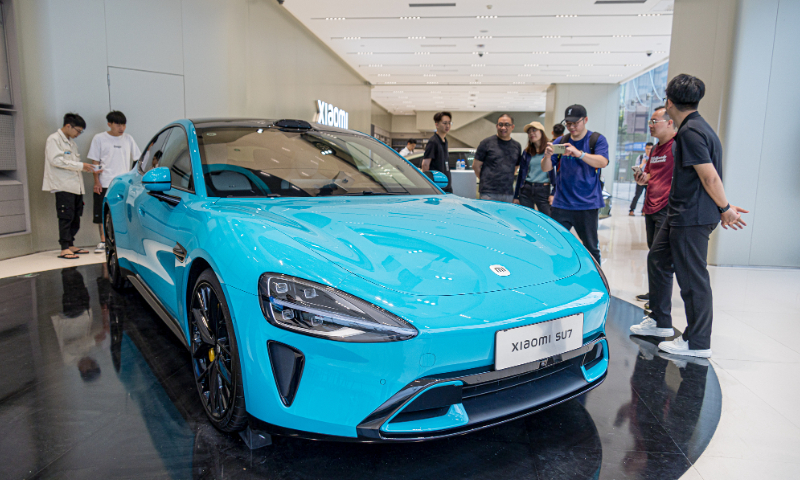Chinese tech giant Xiaomi launches first EV model, joining competitive domestic market

Xiaomi SU7 is seen at a Xiaomi store in Guangzhou, Guangdong Province on March 27, 2024. Photo: VCG
Chinese tech giant Xiaomi held a launch event for its first electric vehicle (EV) model, the Speed Ultra 7 (SU7), in Beijing on Thursday. It marks the smartphone giant's entry into the competitive and challenging Chinese new energy vehicle (NEV) market, analysts said.
Xiaomi has conducted tests using 576 vehicles in 300 cities, with a total road test mileage of 5.4 million kilometers, said Lei Jun, founder and CEO of Xiaomi at the launch event.
The SU7 series will be launched in nine different colors, at a price starting from 215,900 yuan ($29,866), Lei said, adding that mass production is expected to start in the first half of 2024.
Xiaomi Auto said in a post on Weibo on Thursday night that pre-orders hit 50,000 units during the launch event.
Xiaomi has invested over 19.1 billion yuan in 2023 in the initial research and development phase, and the total R&D investment is expected to reach 24 billion yuan in 2024, the CEO said.
The new car has drawn wide attention, including from rival firms. William Li, founder, chairman and CEO of Nio, He Xiaopeng, chairman and CEO of Xpeng, and Li Xiang, founder, chairman and CEO of Li Auto, were all seen at the launch event.
Customers and analysts had previously estimated that the SU7 would be priced at 200,000 to 300,000 yuan. Earlier in the afternoon, at a Xiaomi store at Heshenghui shopping mall in Chaoyang district, Beijing, the Global Times learned that many buyers have already paid around 5,000 yuan ($693) as a deposit, and they are eager to start test driving the car.
Starting from Monday, the SU7 series has been on display in 59 stores across 29 cities in China, a staff member at the store told the Global Times, adding that people have been crowding into the showroom to see the car.
The staff member told the Global Times that the SU7 uses the company's self-developed Hyper OS as the operating system. It connects EV users to other devices, including smartphones.
"China's auto market has welcomed another newcomer," Wu Shuocheng, a veteran automobile analyst, told the Global Times on Thursday. This will increase the already intense competition among major NEV manufacturers, he said.
China's NEV market has become the world's biggest, and carmakers are ramping up efforts to improve technological capabilities amid an ongoing price war.
Xinhua News Agency reported on Monday that BYD, China's top NEV manufacturer, has become the world's first NEV firm to produce 7 million cars. The company reported annual NEV sales of more than 3.02 million units in 2023, maintaining its lead in the global NEV market.
Beijing-based Li Auto posted net income of 11.81 billion yuan in 2023, up 173.5 percent year-on-year, making it the first of China's three EV startups to record an annual profit, media reports said.
Meanwhile, Chinese NEV manufacturers are expanding overseas. About 19.5 percent of EVs sold in Europe last year were made in China and this is on track to reach a quarter in 2024, according to new analysis by Transport & Environment.
All these signs indicate that with the accelerated development of global green travel, Chinese brands are leading the transformation of the automotive industry, Wu said. This is inseparable from China's industrial advantages in the scale and systematization of NEVs, he added.
It's still unknown whether Xiaomi's ambition to fulfil its auto business dream will succeed. However, analysts believe it will drive innovation and progress in NEV technology, and help promote the expansion and market penetration of NEVs by attracting more consumers, and increasing awareness and acceptance of NEVs.
China is the world's largest market for electric vehicles (EVs). In the first two months of 2024, production reached 1.252 million, up 28.2 percent year-on-year, and sales reached 1.207 million, up 29.4 percent year-on-year, according to the China Association of Automobile Manufacturers.
The combined share of EVs and hybrids in China's auto sales is likely to reach 42 percent to 45 percent this year, up from 36 percent in 2023, according to a report by AP citing data from Fitch Ratings on Thursday.
There is also strong support for the development of NEVs at the national level. China will consolidate and enhance its leading position in industries such as intelligent connected new-energy vehicles, according to the 2024 Government Work Report.
Analysts believe that further refinement and implementation of relevant policies will help to continuously consolidate and expand the stable and positive development trend of the automotive industry and stimulate enterprise innovation.
